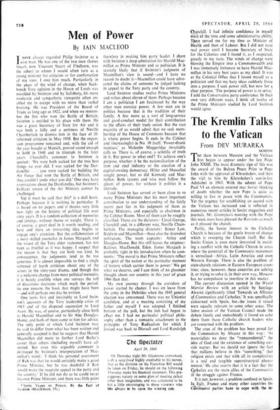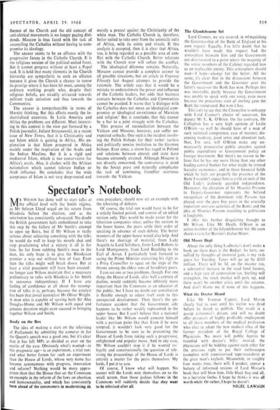The Kremlin Talks to the Vatican
From DEV MURARKA
MOSCOW
THE thaw between Moscow and the Vatican first began to appear under the late Pope John XXIII. The most dramatic sign of this was the award of the Balzan Peace Prize to Pope John with the approval of Khrushchev, and then the visit to him by Khrushchev's son-in-law Adzhubei in 1963. With the advent of Pope Paul VI an element entered into Soviet thinking of doubt whether the new Pope is quite as willing to live in peace with the Communists. Yet the urgency for establishing an accord with the Vatican has increased and is reflected in numerous recent articles in Soviet magazines and journals. Mr. Gromyko's meeting with the Pope this week must have pleased the Russians as much as it pleased the church.
Partly, the Soviet interest in the Catholic Church is because of the gentle breeze of change which is sweeping the Church itself. But the Soviet Union is even more interested in avoid- ing a conflict with the Catholic Church in areas where the potential of the Communist movement is unrealised—Africa, Latin America and even Western Europe. There is also the problem of state-church relations in Eastern European coun- tries; since, however, these countries are solving it, or trying to solve it, in their own way, Moscow has no compulsion to interfere in this matter.
The current discussion opened in the World Marxist Review with an article by Santiago Alvarez significantly titled 'Towards an Alliance of Communists and Catholics.' It was specifically concerned with Spain, butathe issues it raised were equally relevant to some other areas. The latest session of the Vatican Council made the debate timely and undoubtedly it found an echo there from those Catholic church leaders who are concerned with the problem.
The crux of the problem has been posed for the Communists by Alvarez in this way : 'As materialists we deny the "transcendental," the idea of God and the existence of something out- side matter. But we should not ignore the fact that millions believe in this "something," that religion exists and that with all its complexities is a real and tangible superstructural pheno- menon.' He also asserts that it is a fact that the Catholics are the main allies of the Communists in the struggle against Franco.
It is not, however, a problem confined to Spain. In Italy, France and many other countries the aniinunist parties have to cope with the in- fluence of the Church and the old concept of anti-clerical movements is no longer paying divi- dends. Moscow is thus faced with the task of reconciling the Catholics without having to com- promise its ideology.
The answer seems to be an alliance with the progressive forces in the Catholic Church. It is the religious version of the political united front. But it cannot progress without at least a Papal nod. It is held that many elements in the Church hierarchy are sympathetic to such an alliance because it gives the Church a chance to renew its prestige where it has been hit most, among the ordinary working people who, despite their religious beliefs, are steadily attracted towards militant trade unionism and thus towards the Communists.
The answer is comprehensible in terms of Marxist thinking. But this affects mostly the in- dustrialised countries. In Latin America and Africa the problems are different. Most interest- ing in this context is the view put forward by a Polish journalist, Juliusz Stroynowski, in a recent issue of New Times, that it is Christianity and not Islam which is gaining in Africa. His ex- planation is that Islam prospered in Africa mainly under the inspiration of the Arabs and the Indian Muslims. But it is a rigid and mediaeval Islam, which is too conservative for Africa's needs. Also, it clashes with the African nationalism which cannot tolerate Indian or Arab influence. He concludes that the wide acceptance of Islam is not very deep-rooted and merely a protest against the Christianity of the white man. The Catholic Church is, therefore, better suited to take over from the animistic cults of Africa, with its saints and rituals. If this analysis is accepted, then it is clear that Africa, too, is being regarded as a possible area of con- flict with the Catholic Church. Better relations with the Church now will soften the conflict.
The ideological dilemma remains. Naturally, Moscow cannot provide a complete answer to all possible situations, but an article in Voprosy Filosofy last August attempts to provide the rationale. The article says that it would be a mistake to underestimate the power and influence of the Catholic leaders, but adds that business contacts between the Catholics and Communists cannot be avoided. It warns that 'a dialogue with the Catholics does not mean an ideological com- promise or ideological co-existence of Marxism and religion.' But it concludes that this cannot be a bar to a joint struggle with the Catholics.
This process of reconciliation between the Vatican and Moscow, however, can suffer un- expected setbacks. One such is the incident involv- ing the Polish bishops for their rather tactless and politically unwise invitation to the German bishops. Ever since, a storm has raged in Poland and relations between church and state have become extremely strained. Although Moscow is not directly concerned, the controversy is aired by the Soviet press and naturally complicates the task of continuing friendlier overtures towards the Vatican.











































 Previous page
Previous page